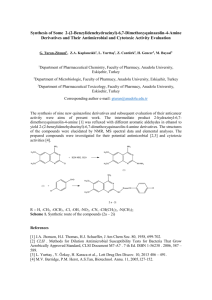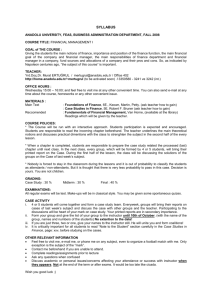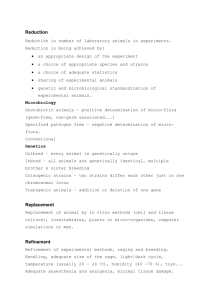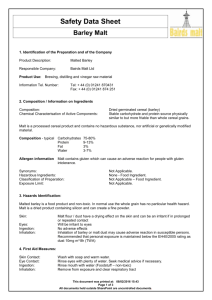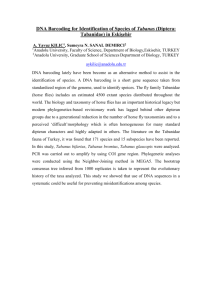Anadolu Efes launched its “Sustainable Agriculture” program as a
advertisement
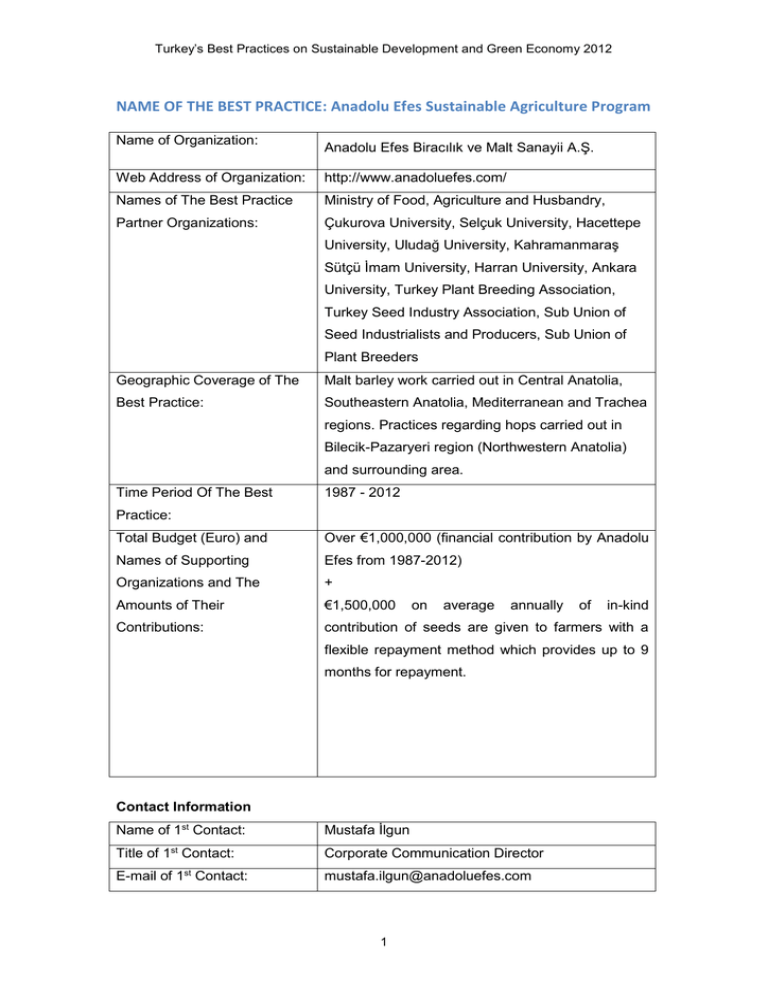
Turkey’s Best Practices on Sustainable Development and Green Economy 2012 NAME OF THE BEST PRACTICE: Anadolu Efes Sustainable Agriculture Program Name of Organization: Anadolu Efes Biracılık ve Malt Sanayii A.Ş. Web Address of Organization: http://www.anadoluefes.com/ Names of The Best Practice Ministry of Food, Agriculture and Husbandry, Partner Organizations: Çukurova University, Selçuk University, Hacettepe University, Uludağ University, Kahramanmaraş Sütçü İmam University, Harran University, Ankara University, Turkey Plant Breeding Association, Turkey Seed Industry Association, Sub Union of Seed Industrialists and Producers, Sub Union of Plant Breeders Geographic Coverage of The Malt barley work carried out in Central Anatolia, Best Practice: Southeastern Anatolia, Mediterranean and Trachea regions. Practices regarding hops carried out in Bilecik-Pazaryeri region (Northwestern Anatolia) and surrounding area. Time Period Of The Best 1987 - 2012 Practice: Total Budget (Euro) and Over €1,000,000 (financial contribution by Anadolu Names of Supporting Efes from 1987-2012) Organizations and The + Amounts of Their €1,500,000 Contributions: contribution of seeds are given to farmers with a on average annually of in-kind flexible repayment method which provides up to 9 months for repayment. Contact Information Name of 1st Contact: Mustafa İlgun Title of 1st Contact: Corporate Communication Director E-mail of 1st Contact: mustafa.ilgun@anadoluefes.com 1 Turkey’s Best Practices on Sustainable Development and Green Economy 2012 Phone of 1st Contact: +90-216-389-5867 Address of 1st Contact: Esentepe Mah. Anadolu Cad. No:1 Kartal 34870 İstanbul – Türkiye Name of 2nd Contact: Tolga Yavuz Title of 2nd Contact: Corporate Communication Manager nd E-mail of 2 Contact: tolga.yavuz@anadoluefes.com Phone of 2nd Contact: +90 (216) 586 25 19 Address of 2nd Contact: same as above address 2 Turkey’s Best Practices on Sustainable Development and Green Economy 2012 1. Organizational Profile Of The Best Practice Owner Number of employees: 1822 Primary brands, products/ services: 9 beer brands (Efes, Bomonti, etc.) Types of customers/beneficiaries: Adult consumers Geographic breakdown of markets served: Turkey 2. Statement Of The Problem/Opportunity: Anadolu Efes launched its “Sustainable Agriculture” program as a response to the limited availability of malt barley and hops suitable for beer production – both in grain quality and quantity – in Turkey prior to 1987. In addition, as a company dependant on agricultural raw materials for its products, Anadolu Efes views the negative impact of climate change and other environmental factors on arable land and water resources as a risk factor for the sustainability of its supply chain. 3. Objectives Of The Best Practice: Anadolu Efes “Sustainable Agriculture” practices aim to ensure the sustainability of high-quality raw materials for production. This objective is supported by three strategies: - Improve quality and resource-efficiency of the agricultural raw materials, - Ensure that these products are grown locally in each market, - Expand supply area and ensure sustainability As per these strategies, the Company targets to increase the quality and variety of the malt barley and hops used in production, by developing new strains that: - require less water to grow, - are resistant to changing climate conditions and, - need less water and energy during the production process. The Company also aims to make sure that the newly-developed strains are farmed correctly by its supplier farmers. 3 Turkey’s Best Practices on Sustainable Development and Green Economy 2012 4. Execution Of The Best Practice: To reach its “Sustainable Agriculture” program targets, Anadolu Efes set up an R&D unit responsible for development and production of new malt barley and hops strains as part of a long-term strategy. Activities in this area can be classified as follows: Plant breeding/strain development Seed production Agricultural support for supplier farmers As a result of its R&D efforts, the Company has developed and registered 15 new malt barley strains and 7 new hops strains, improving both the quality and resource-efficiency. Development of new strains that are resistant to drought and that need less fertilization, water and energy throughout the whole production process are viewed by the Company as important gains in its sustainability efforts. The Company ensures that the newly developed strains are farmed widely by offering contract farming as part of its agricultural support program for farmer suppliers. The Company gives procurement guarantee for crops grown from certified seeds it provides, ensuring efficiency and financial stability for its suppliers. The Company also holds regular training sessions about new farming techniques for its farmer suppliers. Anadolu Efes is not only the biggest buyer of malt barley and hops in Turkey but also the first and only company with R&D and contract farming programs for these crops. 5. Results/Outcome Of The Best Practice: Economic Outcomes: Thanks to newly developed malt barley strains that require less water to grow, new agricultural areas have been opened to malt barley farming. Previously grown only in Cumra area in Central Anatolia, malt barley is now grown also in Adana and Adiyaman, the South Eastern regions with lower 4 Turkey’s Best Practices on Sustainable Development and Green Economy 2012 rainfall. Encouraged by Anadolu Efes agricultural support programs, guaranteed procurement at market prices and certified seed and on-time payments, farmers in these regions have switched to malt barley. As of 2010, close to 3,000 farmer families, including 2,100 under contract farming, earn their livelihood by growing malt barley for Anadolu Efes. 600 of these farmer families reside in Adiyaman, a region which was deemed unfit for barley farming prior to the introduction of strains developed by Anadolu Efes. New hops strains developed by Anadolu Efes offer improved protein quality as well as increased yields and production rates. As a result, total hops farming area increased to 2,777 decares in 2010 from 709 decares in 1989, while the Company’s procurement of hops went up to 1,047 tonnes from 123 tonnes in the same time period. Farming area per supplier increased to 5 decares from 3 decares five years ago. With the increase in yields and productions rates, Anadolu Efes’ 527 contract hops farmer suppliers currently earn about €1,800 per decare which implies total revenues of more than €4 million a year – a significant amount for the economy of a town with a population of 6,500. Direct and indirect employment due to hops farming and production is estimated to be 15,000. Environmental Outcomes: Anadolu Efes has developed 15 new, certified malt barley strains as a result of its R&D efforts in this area. Among these, two strains, “Atılır” and “Fırat”, requires in malt production process 12-24% less electricity, 18-22% less fuel, 40%-47% less water as compared to “Tokak”, the most widely grown barley strain in Turkey. The Company has also developed and registered 7 new strains of hops, including three “aromatic” and four “bittering” strains. These new strains provide a yield increase of 25%-30% as compared to the local strains. 6. Future Plans For The Best Practice: Anadolu Efes has targeted to reduce its water usage per hectolitre of beer by 25% by 2015, as compared to 2010. 5 Turkey’s Best Practices on Sustainable Development and Green Economy 2012 To achieve this target, the Company has committed to continue its R&D efforts to increase the quality and variety of its malt barley and hops strains, develop new strains that are more resistant to changes in climate and require less water and energy during production process. The Company will also seek to expand the land area allocated malt barley and hops by increasing the number of its farmer suppliers and supporting these families. Additionally, the Company will expand those programs in place that aims to support its suppliers and business partners through training and financial support. 7. Lessons learned from the implementation: Since it takes about 10-12 years for a newly developed strain to be commercially viable, “Sustainable Agriculture” program and related work require long-term planning and investment. Thus it is critical that the program is supported by the Company leadership with a long-term perspective and is allocated the necessary time, talent and financial resources. Long-term involvement of partner organizations as well as local municipalities is also a key success factor. 8. Supporting Materials: 6 Turkey’s Best Practices on Sustainable Development and Green Economy 2012 http://anadoluefes.com/index.php?gdil=tr&gsayfa=sr&galtsayfa=tarim&gic sayfa=&gislem=&gbilgi= http://anadoluefes.com/dosya/tarim_in/efes_tarim_brosur.pdf http://anadoluefes.com/dosya/tarim_tr/efes_tarim_brosur.pdf 7
